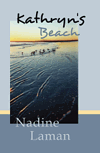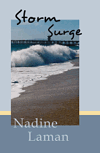Frankly, most first time writers think they are finished when the first draft is written. Trust me, it is just the beginning. That is why it is called a 'draft.'
I don't care if your mother, lover, or best friend says it is wonderful. It is not. What they probably mean is they think YOU are wonderful. And that is probably true.
As a side note, I just read an article about how many people in America think they should (and could) write a novel. If I find it again, I'll post the link at the bottom.
The reality is that most people who write are hobbyists. Being a professional writer is a different mind-set. For one thing, those people study the craft. It is pure BS that you can learn to write well by reading tons of novels. It shows when I read a submitted ms and no study into the craft has been done by the writer, though their library card is well worn.
There are very few natural writers who write at the professional level from day 1. I only know of one writer like that.
So what about everyone else, the non-naturals, who has a passion for writing? I'd say, harness that passion and drive. Take your writing to the next level. Study the craft. Study the industry (which is far less interesting than studying writing). Get serious and disciplined with your writing time. Talk is cheap. Get some ink on the paper.
Write the first draft straight through. Some people like to make an outline first, but I think that is best suited for non-fiction and it drains some of the energy out of the story if too much time is invested in writing an outline for a novel.
Plus, I contend that with an outline, the writer knows things that never get in the book, and that leaves the reader in the dark. They are expected to make leaps when the writer could have easily provided the stepping stones - those tidbits that were in the outline.
Basically, a writer needs to know where their characters are at the beginning and where they want them to be, developmentally, at the end. Find your starting point and write to the end point. If you've learned about the craft, you know how the journey from beginning to end should look on paper. A professional knows how to write a good middle story.
Some people think they need to edit-on-the-fly as they write the first draft. I can tell those who have edited one chapter before writing the next one. It has a disjointed feel to it when I read it. I don't know how else to explain it. Even if I like them, I 'pass' on the ms because it is too much work to fix the flow of energy that should be there.
The correct way to write a draft for a novel is to write from the beginning to end, straight through. Keep your eye on the prize. If you get preachy, it shows. If you go on a side excursion, it shows.
Besides stopping too soon, such as when the first draft is done, some writers do one or two edits and think it is done. Even if a line editor is hired, most do not provide content editing. The only suggestion I'll make on that is to print the whole ms on paper, get a friend who has not read your draft, sit for a whole weekend, and read it aloud to them. Even if you have to go it alone, read it aloud and listen to what is on the page.
Watch for stiff dialogue. How many of us speak grammatically correct in our conversations? Watch for time warps. Watch for telling the reader what is happening rather than showing them. Watch for side excursions where a secondary character tries to upstage the main character. (You can write a novel featuring them some other time.) Of course, you'll see lots of typos. Watch for homonyms and synonyms gone awry. Watch for sentences that are too long (how many breaths did it take to get through that one?). Watch for recycling unusual words too many times. Watch for places that are simply boring as hell and don't move the story forward.
The sooner you read your ms aloud from paper, the shorter the polishing process is...that means the fewer rewrites you will need to do.
There is one odd thing that always seems to happen. As soon as you submit your ms to someone with the hope of a publishing contract, you will see previously hidden mistakes that begin to glare at you and probably would glow in the dark if you were brave enough to turn out the lights.
I get follow-up emails with a horrified panicky tone. If the query letter is well done, and the synopsis is correctly done (and interesting to me), I can over look errors in the ms - providing there aren't a million of them and the writing is still solid.
However, that said, there are so many people writing these days due to laptops vs the manual typewriter, that it is worth it not to submit without letting the ink dry and reading the whole ms again before submitting it to anyone.
And the final word on the topic of "stop" is to not over write. Stop when the story is done. Some people like to keep writing and writing, and writing, because writing is fun. But you have to think about when the reader will feel the story is finished and stop there.
Go! Write your best work!
www.publishingperspectives.com/2011/05/200-million-americans-want-to-publish-books
Sunday, May 29, 2011
Subscribe to:
Post Comments (Atom)

 When Paul Fenton stops for breakfast in a small town, he gets more than he bargained for in the process.
When Paul Fenton stops for breakfast in a small town, he gets more than he bargained for in the process.
 When two-hundred-year-old human remains are discovered on one of Neptune's moons, Earth's history falls into question.
When two-hundred-year-old human remains are discovered on one of Neptune's moons, Earth's history falls into question.
 Emily's husband persuades her to try thalidomide to ease her symptoms as she is unaware of the devastating effects.
Emily's husband persuades her to try thalidomide to ease her symptoms as she is unaware of the devastating effects.
 Who is the women's shelter bomber? Melissa Ryan suspects that her husband knows.
Who is the women's shelter bomber? Melissa Ryan suspects that her husband knows.
 Further developments with the Wilder family.
Further developments with the Wilder family.
 A hidden past shakes the O'Donovan family to its core
A hidden past shakes the O'Donovan family to its core
 A swirl of emotion and choice, set in Cape Town, South Africa
A swirl of emotion and choice, set in Cape Town, South Africa
 Love is a constant, but it comes at a price.
Love is a constant, but it comes at a price.
 When the road ahead is unclear, sometimes you have to rely on trust.
When the road ahead is unclear, sometimes you have to rely on trust.
 The struggle between good and evil is ages old. It gets all the more complicated when the good guys aren't all good and the bad guys have redeeming qualities.
The struggle between good and evil is ages old. It gets all the more complicated when the good guys aren't all good and the bad guys have redeeming qualities.
 Story of a land mothering two races of people – the light-skinned and the dark-skinned.
Story of a land mothering two races of people – the light-skinned and the dark-skinned.
 A gifted Ukrainian ballerina comes into possession of a mysteriously coded address book.
A gifted Ukrainian ballerina comes into possession of a mysteriously coded address book.
 Six passengers' lives change for better or worse after they arrive in Honiton.
Six passengers' lives change for better or worse after they arrive in Honiton.
 Resilience and love in a harsh and unforgiving age
Resilience and love in a harsh and unforgiving age
 Kathryn's Beach
Kathryn's Beach High Tide
High Tide Storm Surge
Storm Surge
I agree with everything you've said here Nadine. I think that a lot of people think they can write. Do these same people think that they can sit at a grand piano and play a Rachmaninov Concerto without first learning the piano and spending many hours per day practising? Writing is the same. Too many people believe that because they have a laptop and can write a shopping list there is a novel inside them.
ReplyDeletesee http://www.cactusrainpublishing.com/
Glyn
Good analogy with the piano, Glyn. I wish whoever said, "To write, you must read." That makes as much sense as to say, to play the piano, you must listen to lots of music. On the other hand, anyone who really wants to write can learn. The have to crave learning to write and know that there are no easy shortcuts.
ReplyDelete